Undergraduate perceptions of value: degree skills and career skills
Received
9th January 2017
, Accepted 1st March 2017
First published on 1st March 2017
Abstract
Recent data suggests that of the UK students graduating with a degree in chemistry in 2015, only 18.9% continued to employment as ‘Science Professionals’. While this shows the wide range of employment that is available for chemistry graduates, it also highlights the need for them to have relevant transferable skills, rather than just the well-developed, subject-specific knowledge that they would be expected to possess. In 2010 Hanson and Overton published a study on the degree skills valued by UK graduates who had found employment and then reflected on the most useful aspects of the degree course. The new investigation reported here expands on this previous work by evaluating the perceived value of these skills by chemistry undergraduate students (years 1, 2, 3) along with their planned occupation after graduation. The results of the skills questionnaire are discussed, along with a survey of the main skills that the students wished to gain by participating in a new extra-curricular module specifically designed to enhance career skills, and the activities designed to develop those skills.
Research questions
What is the undergraduate student perception of the value of degree skills? What skills do students wish to gain in order to enhance employability after graduation?
Background
A degree in a physical science subject such as chemistry enables a graduate to pursue a diverse range of career opportunities (Logan et al., 2016) due to the development of both subject-specific skills and also generic (transferable) skills during the study programme. In the UK, the expected skillset is outlined in the Quality Assurance Agency Subject Benchmark Statement for Chemistry (2014). Professional accreditation of degree programmes also leads to specification of required skills and attributes, such as the Royal Society of Chemistry Accreditation of Degree Programmes (2012), which also enhances the recognition of graduate capabilities. Student employability profiles developed by the Higher Education Academy with the Council for Industry and Higher Education (Rees et al., 2007) can also inform higher education practitioners and guide curriculum development. The actual occupations of UK graduates can be investigated via the Higher Education Statistics Agency's Destinations of Leavers from Higher Education (DLHE) survey,† which provides the most comprehensive picture of what graduates do after completion of their studies, where the survey data is collected six months after graduation to show immediate occupation outcomes while it is still possible to contact large numbers of students and achieve a high response rate. The Universities UK/Confederation of British Industry report ‘Future fit: Preparing graduates for the world of work’, (2009) highlighted the importance of employability skills, and recommended that universities should obtain regular feedback from alumni on how effectively these skills are being developed in their students. A very significant report by Hanson and Overton (2010) investigated ‘Skills required by new chemistry graduates and their development in degree programmes’ by surveying graduates who were in the position to reflect on their degree experience and evaluate the use of skills in their current activities, thus filling an important evidence gap on the value of skills that had existed in this pedagogic area. Some key findings of particular note to this research were: generic skills were scored at a higher level of usefulness than the chemical knowledge/skills; that relative to usage, the generic skills were less well developed than the chemical knowledge/skills within degree programmes. Although the investigations discussed here are in the context of graduates in the UK and related national agency data, it is important to note that a connected replication study in Australia (Sarkar et al., 2016) gave very similar results from their graduate students, highlighting the international significance of such issues. As it has been found that chemistry graduates value generic skills and would have desired to develop these further when studying during their degree, this consequently raised the chemistry education research question investigated here: What is the undergraduate student perception of the value of degree skills? Building on this, and due to an opportunity to develop a new extra-curricular module to provide tailored provision of specialist careers support based on student needs, we also investigated the research question: What skills do students wish to gain in order to enhance employability after graduation?
Data collection
To establish the views of current undergraduate chemistry students a skills questionnaire was developed. The research project was evaluated and conducted under the BERA Ethical Guidelines for Educational Research, and the University of Nottingham Code of Research Conduct and Research Ethics. All student data and opinion comments were obtained via anonymous questionnaires that included free text responses. The questionnaire featured the list of degree skills determined by Hanson and Overton (2010) as shown in Table 1, which are based on the Quality Assurance Agency Subject Benchmark Statement for Chemistry (2007), the Royal Society of Chemistry Accreditation of Degree Programmes (2009) and the Student Employability Profiles from the Higher Education Academy with the Council for Industry and Higher Education (Rees et al., 2007).
Table 1 List of degree skills and classification as chemistry or generic skill sets
| Label |
Degree skill |
Classification |
| A |
Chemical terminology |
Chemistry |
| B |
Fundamental chemical principles |
Chemistry |
| C |
Principles of thermodynamics |
Chemistry |
| D |
Kinetics of chemical change |
Chemistry |
| E |
Inorganic compounds and reactions |
Chemistry |
| F |
Organic compounds and reactions |
Chemistry |
| G |
Analytical techniques |
Chemistry |
| H |
Safe handling of chemical materials |
Chemistry |
| I |
Manipulative practical skills |
Chemistry |
| J |
Skills with chemical instrumentation |
Chemistry |
| K |
Planning and design of experiments |
Generic |
| L |
Interpretation of experimental data |
Generic |
| M |
Numeracy and computational skills |
Generic |
| N |
Report writing skills |
Generic |
| O |
Oral presentation skills |
Generic |
| P |
Information retrieval skills |
Generic |
| Q |
Problem-solving skills |
Generic |
| R |
Team-working skills |
Generic |
| S |
Time management and organisational skills |
Generic |
| T |
Independent learning ability required for continuing professional development |
Generic |
For each degree skill the students were asked ‘With respect to your intended career after completing your undergraduate degree, whether working, training or undertaking other activities, please indicate your opinion of the value of the areas of knowledge or skills listed’, with an option selected from: ‘Very useful’, ‘Useful’, ‘Little use’, ‘No use’. The students were also asked the question ‘To what extent does your planned occupation after graduation involve a knowledge of chemistry?’ and asked to select an option from: ‘Very large extent’, ‘Large extent’, ‘To some extent’, ‘Not at all’. They were also asked the question ‘What are the main skills that you would wish to gain by participating in an extra-curricular module to enhance career skills?’ as a free text response, so as to allow totally open answers including, but not limited to, the skills list presented on the questionnaire form. The questionnaire was distributed as hard copies to undergraduate students in years 1, 2, 3 during lectures of the chemistry degree programme for anonymous completion and return. The majority of students were studying on either the BSc (3 academic year) or the MSci (4 academic year) chemistry degree, however a small number were on joint courses with medicinal or biological chemistry. Some variants of the MSci degree involve international study or industry placement in year 3, hence those class sizes are reduced. The questionnaires were distributed across all cohorts at the same time in the second semester, so that year 1 students were able to acclimatise to university level study before their views were surveyed. The data collection process was repeated as a second data collection cycle in the following academic year, firstly to establish whether consistent data was being obtained, and secondly to monitor any change in views of a student cohort as they moved between different years in the degree programme. Table 2 shows the response rates obtained from the surveys over the two academic years of collection. The results from the two separate cycles of data collection did show very similar results, and therefore the charts presented here are based on the second cycle of confirmed data unless otherwise stated, in order to avoid possible confusion with the same cohort of students appearing in two different years within the same charts or within aggregated year data.
Table 2 Questionnaire data collection cycles and responses
| Data collection cycle |
Student cohort, year of study (class size of surveyed lecture module) |
Questionnaire responses (and percentage return) |
Number of free responses for career skills |
| 1 – 2011 |
Cohort A, year 1 (109) |
82 (75%) |
44 |
| 1 – 2011 |
Cohort B, year 2 (156) |
96 (62%) |
44 |
| 1 – 2011 |
Cohort C, year 3 (115) |
69 (60%) |
26 |
| 2 – 2012 |
Cohort D, year 1 (169) |
117 (69%) |
51 |
| 2 – 2012 |
Cohort A, year 2 (179) |
74 (41%) |
30 |
| 2 – 2012 |
Cohort B, year 3 (79) |
47 (59%) |
26 |
Results and discussion
The analysis of the extent of chemistry knowledge use in the planned occupation after graduation was carried out for students in each year, the results of which are shown in Fig. 1. It is notable that such a large percentage of students across all three years expect a chemistry-focussed career, indicated by a selection of ‘Very large extent’ or ‘Large extent’. Data from the annual Higher Education Statistics Agency's Destinations of Leavers from Higher Education (DLHE) surveys from 2011–2016 (Redman et al., 2011, 2012, 2013, 2014; Goldwyn-Simpkins et al., 2015; Logan et al., 2016) indicate that the percentage of chemistry graduates proceeding to employment as ‘Scientific Research, Analysis & Development Professionals’ was actually between 17.9% to 21.6%, however it can be seen that the undergraduate students have a much higher expectation of chemistry use in their occupation. Indeed, analysis of the DLHE career destinations of these student cohorts after graduation from this Nottingham programme (n = 588, 74% response rate) reveals that 19% of graduates were in chemistry-related employment, 38% proceeded to further research study and 5% were in further study for teaching. Overall, combining chemistry employment and further studies, 62% of Nottingham graduates could be considered in ‘Chemistry occupation’ and 38% in ‘Other occupation’. Therefore although the ratings of intended chemistry use appear high, the students' predictions as undergraduates did prove to be generally correct, since the numbers going into scientific employment were around UK national average, whereas a large number of students continued into further study after graduating. For comparison, in data from the related Hanson and Overton (2010) study, the ratings for chemistry involvement in activities since graduation were ‘Very large extent’ ∼38%, ‘Large extent’ ∼22%, ‘To some extent’ ∼23%, ‘Not at all’ ∼16%, although it was noted that this data was distorted by the number of chemistry graduates undertaking PhD study. With the undergraduate data, it is also interesting to observe the shift in the distributions that occurs as the students move to higher years, particularly in the case of year 3 students who are closest to graduation and actual employment, where although selection of ‘Very large extent’ and ‘Large extent’ is still high, there is a notable increase in the percentage of students selecting ‘To some extent’ or ‘Not at all’. The change through the years may be due to an initial subject optimism in year 1 with new undergraduate students changing to a greater awareness of different career paths accessible to chemistry graduates as the years of study progress, particularly in year 3 where the realism of the approaching end of study and involvement in applying for employment may alter perspectives. However it is also noteworthy that most of the undergraduate students have actually already thought about career destinations (indicated by providing a considered rating of the extent to which the occupation will utilise a knowledge of chemistry), as the percentage of students selecting ‘Unknown’ is reasonably small at around 5%, and this remains similar across all years 1, 2, 3.
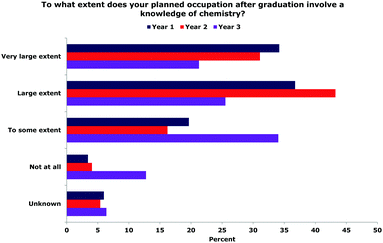 |
| | Fig. 1 Undergraduate students in years 1, 2, 3, rating the extent of chemistry involvement in their planned occupation after graduation. | |
Undergraduate student perception of the value of degree skills
Based on the data on planned chemistry involvement in future careers, the students could then be split into two groups for analysis of the skills ratings: students selecting ‘Very large extent’ and ‘Large extent’ were combined as the ‘Chemistry occupation’ group, while those selecting ‘To some extent’ or ‘Not at all’ were combined into the ‘Other occupation’ group. The views of the two career groups could then be compared in terms of the rating value given to each degree skill. Fig. 2 shows the perceived value of each degree skill via the percentage of students selecting ‘Very useful’ or ‘Useful’ in relation to chemistry involvement in planned occupation, via the occupation groups for year 3 students (many of whom would be graduating that year). It can be seen that ‘Chemistry occupation’ students rate both the subject-specific chemistry focussed skills and the generic (transferable) skills highly. By contrast the ‘Other occupation’ students rate the generic skills highly, however most of the chemistry skills are not so highly valued, although ‘Analytical techniques’ and ‘Manipulative practical skills’ are still highly rated (perhaps as a consequence of analytical skills and tackling practical problems providing experience of the ‘scientific method’ of carefully and methodically analysing and tackling an unknown problem, which could be could still be an effective approach even on a non-scientific task).
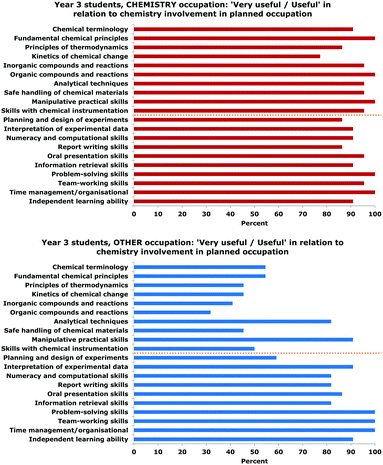 |
| | Fig. 2 Perceived value of each degree skill via the percentage of students selecting ‘Very useful/Useful’ in relation to chemistry involvement in planned occupation, for the ‘Chemistry occupation’ group (upper) and ‘Other occupation’ group (lower) of year 3 students. Orange dotted line marks separation between chemistry skills (top) and generic skills (bottom). | |
To readily compare chemistry skills to generic skills across the different years, the ‘Very useful’ and ‘Useful’ skills ratings selections can be combined to give a mean percentage for the chemistry skills, for comparison to the mean percentage of the generic skills, as shown in Fig. 3. For each year, students in the cohort intending a ‘Chemistry occupation’ rate both subject-specific chemistry skills and generic skills highly, with no significant difference between the two (p > 0.05), whereas ‘Other occupation’ students rate the generic skills highly, and significantly more than the chemistry skills (p < 0.05). It is interesting to note that all students rate the generic skills highly, even though these are often not so explicitly taught as part of degree programmes. This also matches with the views of graduate students in employment (Hanson and Overton, 2010) which highlighted development deficits (high use in employment versus low development in degree) for generic skills, as shown in Fig. 4, therefore the generic skills are seen to be valued by undergraduates and graduates alike. The consistency of chemistry to generic skills value ratings was also maintained through the two rounds of data collection as the cohorts of students progressed to the next academic year and sequential year of study (although the first round of data collection had more similar ratings for ‘Other occupation’, Generic skills, with ratings between 50–60% across all years 1, 2, 3 (cohorts A, B, C) rather than the higher year 1 rating seen for new cohort D in Fig. 3). In view of the fact that all undergraduate students had a high perceived value for generic skills (Fig. 3) and that graduates report underdevelopment of generic skills (Fig. 4) it was decided to investigate new module activities that could be provided to improve generic skills development, aiming to enhance employability after graduation.
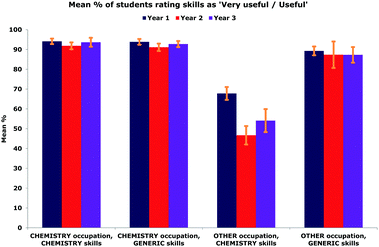 |
| | Fig. 3 Mean percentage of students in years 1, 2, 3, rating skills as ‘Very useful/Useful’ with respect to chemistry involvement in planned occupation after graduation. Error bars are the standard error of the mean. | |
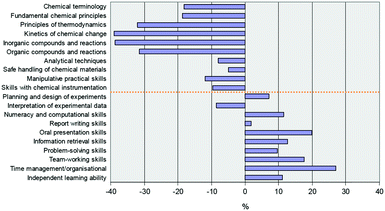 |
| | Fig. 4 Skills development deficits as rated by graduates in employment. A positive development deficit indicates that the area of skill has been developed to a low extent relative to high usage and vice versa (reproduced with author permission from Hanson and Overton, 2010). Additional orange dotted line marks separation between chemistry skills (top) and generic skills (bottom). | |
Skills students wish to gain in order to enhance employability
We have previously reported methods used to enhance this degree programme by incorporation of synoptic tasks that develop both chemistry and generic skills while supporting the study of core chemistry material (Galloway and Burns, 2015), however in this case we felt there would be benefit from an additional extra-curricular module to specifically target employability and generic skills. This new ‘Career Skills for Chemists’ module would be run in collaboration with the University of Nottingham Careers Service and scheduled to take place at the end of the academic year, after the completion of the examinations but before the end of the term, thus productively utilising available student time that would not be used for core degree activities. This scheduling also coincided with the annual Careers Fair organised by the University, and it was also felt that the timing was beneficial for students applying for summer holiday jobs or placements in the following academic years. The module would be part of the employability-focussed Nottingham Advantage Award scheme that provides official recognition of the successful completion of extra-curricular activities through inclusion on the degree transcript, even though the module is outwith the core degree curriculum. In order to guide the development of the contents of the new module, the results from the undergraduate survey were used to determine the skills desired by students. The free text responses to the question ‘What are the main skills that you would wish to gain by participating in an extra-curricular module to enhance career skills?’ were coded against the degree skills list of Table 1, and additional desired skills were also determined, as listed in Table 3 in a new set classed as employment skills. The free text responses tended to be either be direct statements of the skills from the provided list (A–T in Table 1) or very short responses of a few words such as ‘finding career options’ and so were easily grouped into the new list of skills (X1–X9 in Table 3). These include skills such as identifying different career paths that are available (and potential candidate suitability), skills involved in applying for jobs, creation of a high quality Curriculum Vitae, interview skills, awareness of the business/management or intellectual property issues important to employers, and also skills involved in leading the working of others, such as confidence, leadership and teaching. The importance of leadership skills has been reported in cases where undergraduates are motivated to undertake leadership education in order to enhance employability and impact (Ho et al., 2016) and as being desirable in graduates (Sarkar et al., 2016). A need for business awareness skills has also been highlighted in reports from employers (‘Future fit: Preparing graduates for the world of work’, 2009; Redman et al., 2012, 2013) and recent graduates in employment (Hanson and Overton, 2010; Sarkar et al., 2016). It should be noted that business/management and intellectual property awareness feature in the ‘Enterprise for Chemists’ module that is also available to these Nottingham students in the latter part of the degree programme. The skills desired by the undergraduate students are shown in Fig. 5, and it is mainly the generic skills and these additional employment skills which the students wish to gain from the new module (the generic skills requests also being consistent with the development deficits of Fig. 4 and Hanson and Overton, 2010). Guided by these findings, the ‘Careers Skills for Chemists’ module was then constructed, particularly looking to feature oral presentation skills, team-working, time management and organisation, skills in identifying career path options, applications including creation of a suitable CV, and interview skills. The module programme featured a variety of interactive seminars: from the careers service about available support and career paths; from invited employers (both chemistry and other companies such as finance) on recruitment and graduate schemes; and from chemistry staff on postgraduate study and academic career pathways. The participating students were assigned into groups and tasked with investigating a particular career pathway (including potential employers, entry requirements, application processes, graduate schemes, duties and responsibilities, salary potential), with the aim to present these results as a group oral presentation to the other students at the end of the module. Students were also asked to individually maintain and submit a reflective log of activities and findings, to obtain named contacts and leads from discussions with employers exhibiting at the Careers Fair, and prepare a mock covering letter and CV for use in practice interviews with Careers Service staff. Students obtained individual feedback from the Careers Service staff on their written and interview performance, and gained feedback on their group presentation from Careers Service staff, chemistry academic staff and peers. The approximately 1.5–2 week module duration has to be carefully scheduled to fit into the gap between the completion of the exams and the end of term, typically with one day for each major activity such as interactive seminar, mock interview or Careers Fair visit. The new module was advertised to all years 1, 2, 3, with the relevance particularly highlighted for students intending to apply for placements as part of their studies, or students applying for jobs. The students who elected to take the module were mainly those completing year 1 and year 2 (many were on MSci degree programmes that include competitive employer placement schemes) with a split of approximately two thirds ‘Chemistry occupation’ and one third ‘Other occupation’ students. After completion of the ‘Career Skills for Chemists’ module the students were asked to reflect on their experience and identify skills that they had developed during the activities. The data was collected using an anonymous module feedback questionnaire that was separate to the module activities and student reflective log. The responses to the question ‘What are the main skills that you feel you have gained by participating in this module?’ that featured a tick-box list of all skills A–T from Table 1 and X1–X9 from Table 3, are shown in Fig. 5. Pleasingly, the views of the students confirmed that the activities had successfully developed the desired generic and employment skills, and the module has received consistent positive feedback from staff, guest speakers and students.
Table 3 Additional career skills desired by students to help employment after graduation
| Label |
Requested career skill |
Classification |
| X1 |
Career path options |
Employment |
| X2 |
Job applications |
Employment |
| X3 |
Interview skills |
Employment |
| X4 |
CV skills |
Employment |
| X5 |
IP Issues |
Employment |
| X6 |
Business/management |
Employment |
| X7 |
Confidence |
Employment |
| X8 |
Teaching |
Employment |
| X9 |
Leadership |
Employment |
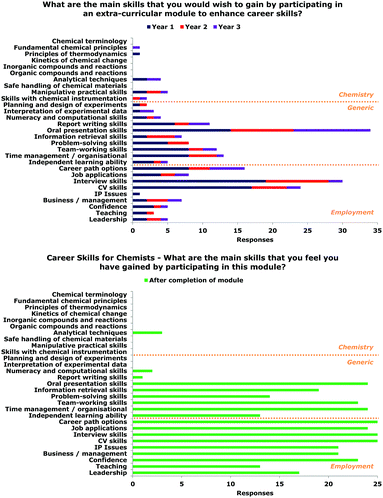 |
| | Fig. 5 Skills desired by students in years 1, 2, 3, to enhance employability (upper) and skills gained from ‘Career Skills for Chemists’ module activities (lower). Orange dotted lines mark separation between chemistry skills (top), generic skills (middle) and employment skills (bottom). | |
Conclusions
Survey data has revealed that undergraduate students have a greater awareness of their planned occupation and of the related value of types of degree skills than may be expected. Students with a high subject involvement in their planned occupation valued both subject specific skills and generic skills highly, with no statistically significant difference between the two (p > 0.05). Students with a low subject involvement in their planned occupation valued generic skills significantly more than subject specific skills (p < 0.05). All students valued the generic skills highly, even though these are often not explicitly taught as part of degree programmes. Generic and employment skills were the most common skills that students wished to gain in order to enhance their career prospects. Employment skills such as discovering career path options, applying for positions, writing an effective CV, and interview skills can be successfully delivered through integration of University Careers Service support expertise within a chemistry-hosted module.
Acknowledgements
Thanks go to Dr Jason Camp for assistance with distribution of the student questionnaires and for development of the Careers Skills for Chemists module, and to the University of Nottingham Careers Service for module support.
Notes and references
- Accreditation of Degree Programmes, (2009), The Royal Society of Chemistry, United Kingdom.
- Accreditation of Degree Programmes, (2012), The Royal Society of Chemistry, United Kingdom.
- Future fit: Preparing graduates for the world of work, (2009), Universities UK/Confederation of British Industry, ISBN 978 0 85201 698 5.
- Galloway K. W. and Burns S., (2015), Doing it for themselves: students creating a high quality peer-learning environment, Chem. Educ. Res. Pract., 16, 82.
- Goldwyn-Simpkins H., Ball C., Montgomery J., Grey B., Hill G., Howie J., Kempster H. and Palmer K., (2015), What do graduates do? Higher Education Careers Services Unit, Association of Graduate Careers Advisory Services, ISBN 978 1 84016 201 1.
- Hanson S. and Overton T., (2010), Skills required by new chemistry graduates and their development in degree programmes, Higher Education Academy, Physical Sciences Centre, University of Hull, ISBN 978 1 903815 29 8.
- Ho S. S., Wong B. B. M., Tham M. and Brokkes R. H., (2016), Science Undergraduates Are Motivated to Undertake Leadership Education to Enhance Employability and Impact, Int. J. Innovation Sci. Math. Educ., 24(3), 71–83.
- Logan E., Prichard E., Ball C., Montgomery J., Grey B., Hill G., Howie J., Kempster H. and Palmer K., (2016), What do graduates do? Higher Education Careers Services Unit, Prospects, Association of Graduate Careers Advisory Services, ISBN 978 1 84016 218 9.
- Redman J., Ball C., Youngson P., Montgomery J., Penn D., Willis J., Laidlaw K., Critchlow N., Philpott G. and Macfarlane M., (2011) What do graduates do? Higher Education Careers Services Unit, Association of Graduate Careers Advisory Services, ISBN 978 1 84016 168 7.
- Redman J., Ball C., Youngson P., Montgomery J., Critchlow N., Fernandes V., Hancock E., Philpott G., Macfarlane M. and Penn D., (2012) What do graduates do? Higher Education Careers Services Unit, Association of Graduate Careers Advisory Services, ISBN 978 1 84016 179 3.
- Redman J., Montgomery J., Critchlow N., Fernandes V., Hancock E., Howie J. and Macfarlane M., (2013), What do graduates do? Higher Education Careers Services Unit, Association of Graduate Careers Advisory Services, ISBN 978 1 84016 189 2.
- Redman J., Ball C., Montgomery J., Fernandes V., Hancock E., Hill G., Howie J. and Kempster H., (2014), What do graduates do? Higher Education Careers Services Unit, Association of Graduate Careers Advisory Services, ISBN 978 1 84016 190 8.
- Rees C., Forbes P. and Kubler B., (2007) Student employability profiles, A guide for higher education practitioners, Higher Education Academy, Council for Industry and Higher Education, ISBN 978 1 905788 40 8.
- Sarkar M., Overton T., Thompson C. and Rayner G., (2016), Graduate Employability: Views of Recent Science Graduates and Employers, Int. J. Innovation Sci. Math. Educ., 24(3), 31–48.
- Subject Benchmark Statement for Chemistry, (2007), The Quality Assurance Agency for Higher Education, United Kingdom, ISBN 978 1 84482 725 1.
- Subject Benchmark Statement for Chemistry, (2014), The Quality Assurance Agency for Higher Education, United Kingdom.
Footnote |
| † Further details of the Destinations of Leavers from Higher Education (DLHE) survey data can be found via online resources from the Higher Education Funding Council for England (http://www.hefce.ac.uk/lt/dlhe/) and the Higher Education Statistics Agency (http://https://www.hesa.ac.uk/data-and-analysis/students/destinations). |
|
| This journal is © The Royal Society of Chemistry 2017 |
Click here to see how this site uses Cookies. View our privacy policy here. 





